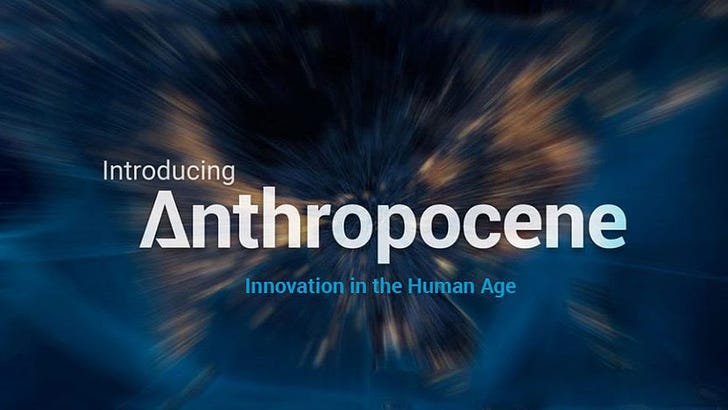Resource: Anthropocene Magazine
Solutions focused creativity from scientists, designers, and entrepreneurs
Today’s Friday resource is Anthropocene Magazine, published by Future Earth.
The trailer (video above) is short and beautifully done. You can read their About page:
Boiled down to its essence, the current climate change and conservation media script goes something like this:
Alert people to the crisis
Summon their alarm and outrage
Hope that their behavior changes
We seem to be stuck on step #2.
Anthropocene is changing the game plan. Where traditional environmental reporting has focused on the crisis, we are focusing on solutions. Anthropocene convenes, across multiple media outlets, the world’s most creative writers, designers, scientists, and entrepreneurs to explore how we can create a sustainable Human Age we actually want to live in.
I’ve been following Anthropocene (RSS subscribed) for a while, and I bookmark and skim/read many articles. On the face of it, the publication looks like it’s centered on climate, but in fact the articles are wide-ranging. It’s solutions oriented.
Our audience is anyone anywhere committed to making sustainability a reality—not just an aspiration. We specifically target influencers in academia, civil society, business, government, and philanthropy. Our goal is to amplify the tremendous creativity in the field and to make sure the best ideas in sustainability get into the hands of those people that can do the most with them.
Without further ado, I invite you to browse and subscribe.
Have a great weekend.




You might be interested in an article in the Washington Post three days ago:
"This word was rejected by geologists. But it’s already taken over the world.
A panel of scientists rejected the term “Anthropocene” to describe a period in which humans have profoundly impacted the environment — but others keep using it.
Yet for many activists, artists and academics outside of geology, the Anthropocene, or “Age of Humans,” is here to stay, regardless of what rock specialists have to say.
Earlier this year, a panel of geologists rejected a proposal to officially designate the past seven decades, during which humans profoundly impacted the environment, as the new chapter in the planet’s history.
But as these scientists spent years debating, the term became widely adopted outside geology to encapsulate the angst around environmental degradation — popping up in book titles, music albums and art exhibitions."
[‘Anthropocene,’ rejected by geologists, has already taken over the world - The Washington Post](https://www.washingtonpost.com/climate-environment/2024/06/10/anthropocene-epoch-human-climate-impacts/)
Hi Mike, thanks for reading!
The “Anthropocene” is the name used for a proposed new geological epoch acknowledging the profound impact humans are having on the planet, including climate change, biodiversity loss, impacts on landscapes and water, and so on. “Anthropos” is Greek for “the human being,” so the term literally means the "new human" epoch.
There’s significant debate about *when* the Anthropocene started, reaching all the way back to the origins of agriculture. More often, scientists, economists, and historians will suggest early globalization (1500’s) or the industrial revolution (19th c) or the “Great Acceleration” in the mid-20th c.
Technically, the Anthropocene Working Group of geologists recently rejected the proposal to add an *official* new epoch defined according to a very precise date of 1950. The term is nevertheless admitted even by these scientists to be a useful working concept.
From Wikipedia (https://en.wikipedia.org/wiki/Anthropocene):
"The IUGS statement on the rejection concluded: 'Despite its rejection as a formal unit of the Geologic Time Scale, Anthropocene will nevertheless continue to be used not only by Earth and environmental scientists, but also by social scientists, politicians and economists, as well as by the public at large. It will remain an invaluable descriptor of human impact on the Earth system.' "